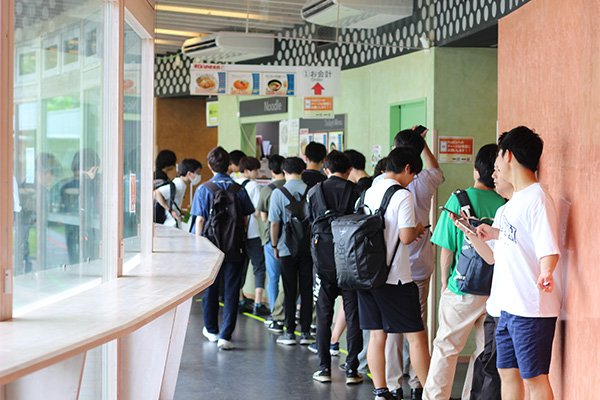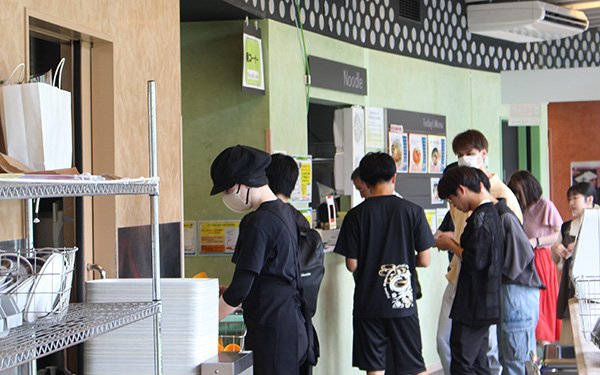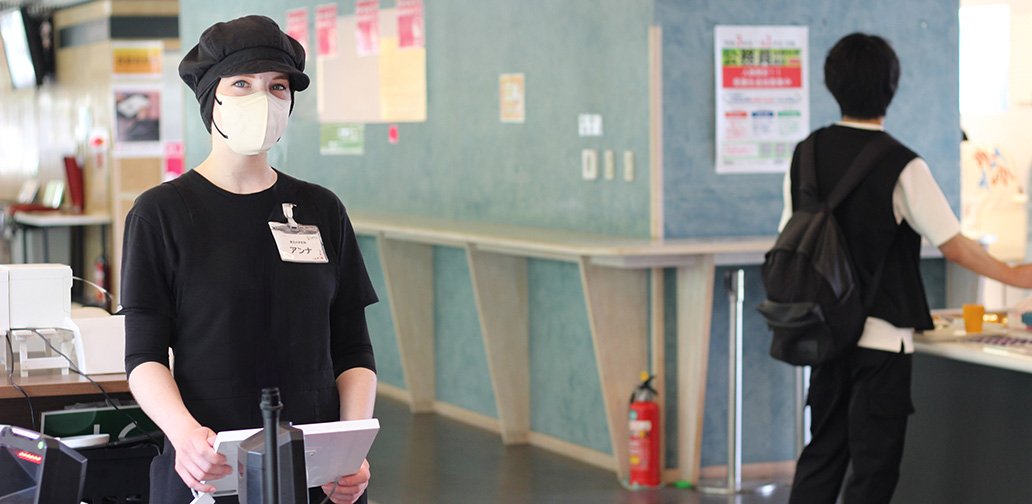Each year, hundreds of foreign exchange students come to study at Tohoku University before returning to their home country. Or do they? We interviewed a foreign exchange student from Germany named Anna who has done several exchanges before, and is already making plans to come back to Japan again.
This is a snapshot of the life of a foreign exchange student. In order to help prospective exchange students know what to expect and what it's like to work part-time, we sat down with Anna to hear about her experience firsthand.
In Anna's case, it was busy but rewarding.

We meet Anna at Kitchen Terrace Couleur (Kawauchi Campus) just as the lunch rush is about to start. However, instead of picking up a tray to order food, she's standing alert at the cash register, clad in a black uniform. While studying at Tohoku University, she also works part time at various cafeterias around Kawauchi campus. She juggles two other part-time jobs as well.
Today is her last shift before she has to return to Germany.
The Reactions to a Foreigner Working Part-time
It's relatively rare to have students working in the cafeteria, let alone an exchange student, so some customers were surprised. However, they quickly became used to it when they discovered she spoke fluent Japanese (as well as German and English).

Anna tells us that overall, everyone was nice. "To be honest, most students just ignore me," she laughs, "No one is going to come up to me and start complaining or acting rude."
She emphasizes that learning Japanese is the key to success. "Many Japanese people aren't scared of foreigners - they're scared of not being able to communicate," explains Anna, "On my first day of work, as soon as they realized we could talk with each other normally, they were so relieved." Learning Japanese lets students forge bonds with locals - in professional settings and otherwise. For example, Anna fondly recalls going to sakura viewing parties with her co-workers after busy shifts. "We're a bit like a family," she tells us.
Advice for students who want to work part-time

An acquaintance suggested the cafeteria as a job option, and it ticked all the right boxes. "A University job is a safe choice - it won't be a black company [a predatory company that forces unpaid overtime work and abuses its employees]," Anna advises, "I think it's better than convenience store work where you might have late shifts and have to deal with drunk customers coming in. This feels like a safe option. It's also convenient to commute to, because it's right on campus."
The manager of the cafeteria, Naomichi Sahara, states "We want to recruit more foreign students to try working part time at the University." He also notes that students still learning Japanese can apply for non-customer-facing roles. Although foreigners on a student visa need to apply for permission to work part-time, Anna's experience with this was smooth.

Working part-time in Japan could become an important part of an exchange abroad. Those who feel isolated in a new place would gain a family of friendly co-workers, and those who plan to come back would already have job experience (in Japan) on their resume. More practically, it earns back the money spent to come to Japan in the first place. In order to achieve her goals, Anna has diligently been balancing 3 part-time jobs and school. "It's not easy, but I need to do it. Moving to Japan is expensive, especially if you don't get a scholarship," says Anna. She plans to finish up her degree in Germany and then hopefully take it slow for a bit and recover before her next move.
"I want to do a double masters degree at Tohoku University and Paderborn University in Germany," she explains, "This will let me get a certificate from both universities, by spending 50% of my time at each institution."
Final remarks
As we start to leave the cafeteria, a co-worker with a nametag reading "Kon" approaches Anna with a beautiful bouquet of flowers to thank her for all her hard work and say goodbye. "She was like an adoptive mom," Anna tells us.
"She brightened the mood of the entire room," remarks Kon with a beaming smile, "Everyone here loved her."
When we say goodbye to Anna, she bows deeply to us just outside the cafeteria, flower bouquet in hand. She is still in her uniform, as if ready to start another shift. Maybe in another year or so when she comes back, she will.


Link:
- International Student Help Desk:
https://www.insc.tohoku.ac.jp/english/support/international-student-help-desk/ - Part-time Jobs on Campus:
https://www.career.ihe.tohoku.ac.jp/en/students-en/arbeit/
For part-time Jobs in the cafeteria, please see posters in-store for details
Contact:
Student Exchange Division
Email: studyab grp.tohoku.ac.jp
grp.tohoku.ac.jp

